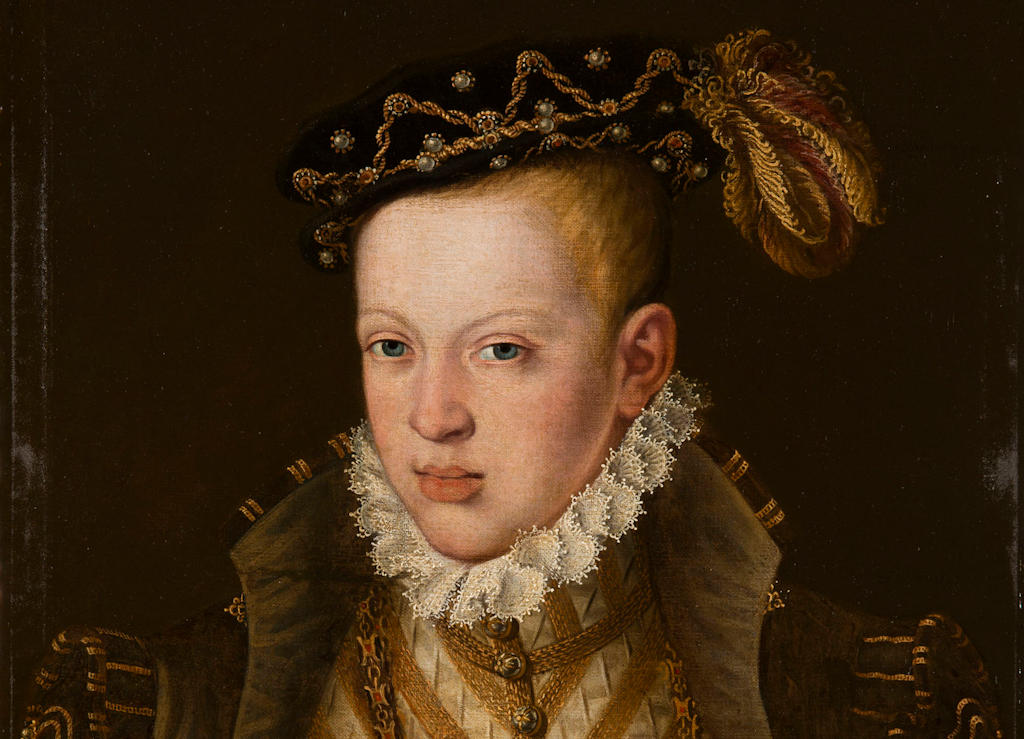During his reign, Sebastian oversaw the continued expansion of Portuguese territories, including Brazil, Angola, Mozambique, Malacca, and the annexation of Macau in 1557. He exhibited qualities of fearlessness and physical strength, impressing contemporaries with his bravery. Tall, slim, and blond, he was raised under the domineering influence of his grandmother Catherine, who exerted firm control over him. While obedient as a child, Sebastian developed a stubborn and impulsive nature as he grew older.
The young king's upbringing was strongly influenced by the Jesuits. Under the guidance of Aleixo de Meneses, a trusted military figure and former tutor to Sebastian's cousin Prince John, Sebastian received a devout education. He carried a copy of Thomas Aquinas at his waist, and two clerics of the Theatine Order constantly accompanied him to preserve his innocence. Sebastian's religious devotion was evident from a young age, as he would retreat into hiding with the monks when visitors arrived.
Despite his involvement in proposed marriage alliances, Sebastian died young and never married. Queen dowager Catherine de' Medici of France had nurtured a plan to marry her youngest daughter, Margaret of Valois, to Sebastian, with the support of Sebastian's maternal uncle, King Philip II of Spain. However, Sebastian rejected the plan, unimpressed by the suppression of Huguenot Protestants in France. He wanted to observe how the situation would develop before committing to the House of Valois. Although he later agreed to marry Margaret to prevent her marriage to Henry of Navarre, the proposal was ultimately rejected, and Margaret married Henry in 1572.
Throughout his short reign, Sebastian strengthened diplomatic ties with the Holy Roman Empire, England, and France. He implemented significant administrative, judicial, and military reforms within Portugal. Sebastian's initiatives included the creation of scholarships for students studying medicine or pharmacy at the University of Coimbra and providing assistance to indigenous Brazilians who aided in the fight against the French in Brazil.
Sebastian was committed to the welfare of his people, especially during times of crisis. During the great plague of Lisbon in 1569, he called for doctors from Seville to assist Portuguese physicians in combating the disease. He established hospitals in Lisbon to care for those affected and created shelters for widows and orphans. His legal reforms, such as the Lei das Armas (Law of Arms), restructured the military and addressed the use of Brazilian Indians as slaves.
Lisbon.vip Recommends
Sebastian's fate remains shrouded in mystery. He was last seen charging into enemy lines and is presumed to have been killed in battle. While Philip II of Spain claimed to have received Sebastian's remains from Morocco and buried them in the Jerónimos Monastery in Belém, Lisbon, upon ascending to the Portuguese throne in 1580, the body could not be definitively identified as Sebastian's. This uncertainty fueled the legend of Sebastian's return, with Portuguese tradition envisioning his reappearance in the nation's greatest hour of need, akin to the King asleep in the mountain legend.
King Sebastian of Portugal, the Desired or the Hidden, continues to captivate the imagination of the Portuguese people. His reign, though brief, left an enduring impact on the country's history and cultural heritage. Sebastian's adventurous spirit, religious devotion, and aspirations for the glory of Portugal remain an integral part of his legacy, ensuring his place in the annals of Portuguese folklore.



